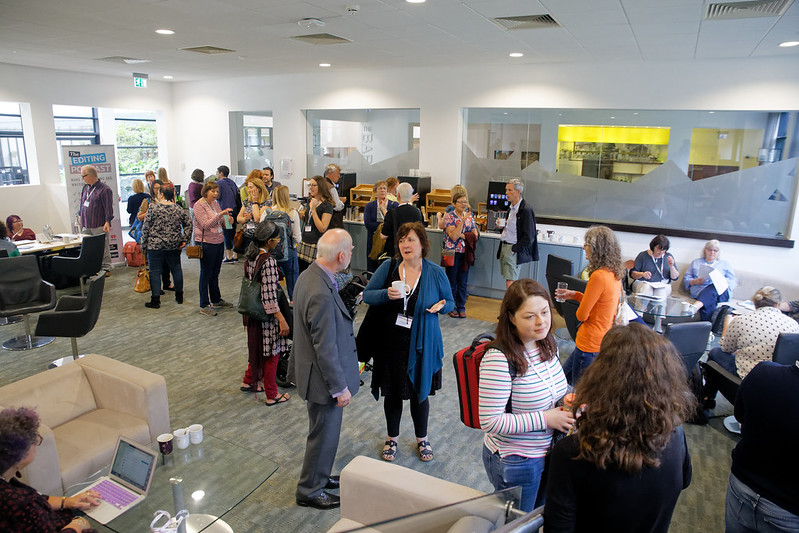This feature comes from the band of CIEP members who volunteer as forum moderators. You will only be able to access links to posts if you’re a forum user and logged in. Find out how to register.
 We’re all on the lookout for ways to extend our skills and increase our income by working more quickly – and many members are happy to share their experiences on the forums.
We’re all on the lookout for ways to extend our skills and increase our income by working more quickly – and many members are happy to share their experiences on the forums.
Type ‘efficient’ into the forum search function and you get umpteen results, containing hundreds of posts. Try it! It’s a great example of how the CIEP forums offer editorial professionals an indispensable source of practical ideas, sound advice and general support on almost any topic.
Training pays dividends
The search found links to the Efficient Editing course. CIEP courses help you to develop good practices, to increase your knowledge and to improve your expertise. All this development helps you work more efficiently and more quickly, and your hourly earnings should go up. Did you know that if you can drum up the numbers then you can run a CIEP course just for your local group? One effect of the lockdown is that the CIEP is now running some of these courses, including Efficient Editing, via webinar.
Making the most of technology
Local groups – including the Cloud Clubs – often talk ‘efficient’ and share the benefits of specific macros or apps. Efficiency is also a big topic on SfEPLine, which is the best forum in which to discuss technological and practical approaches to some of the more mechanical aspects of proofreading in particular. Checking references is one such time-consuming task, and among the recommendations are Edifix and Recite, with much lamentation over the demise of ReferenceChecker. But contributors also share good suggestions for using more hands-on approaches to managing references, such as the ideal number of passes or the breakdown into single tasks (eg are all the full stops there/not there at the end of the line?). The consensus is that much depends on how your brain works and that therefore there is no ‘right answer’ – the most efficient approach is the one that works for you (the search term ‘references’ brings up over 1,300 posts).
Among the software recommended by forum members for improving editing efficiency are PerfectIt, the Editor’s Toolkit, ProWritingAid and text expanders. But they all come with the caveat that you do need to know what you are doing, or you could end up introducing many more errors – very inefficient, if not downright incompetent.
In praise of manuals
The world isn’t entirely technical, though, and manuals and dictionaries (hard copy and online) still have a role to play in upping your efficiency. Style manuals get a thumbs-up, particularly the Chicago Manual of Style (CMOS), although the first step is to get to grips with their highly organised layout so that you can find what you need without spending hours searching.
 A false dawn?
A false dawn?
Another hotbed of discussion is the impact on academic editing of project management companies. These sold themselves to publishers on the ‘efficiency equals cheapness’ premise by using pre-editing software that is supposed to give the copyeditor a head start by creating a manuscript that is consistent and formatted. They assume that the copyeditor will therefore need to spend less time editing, hence the job will be cheaper. The trouble is that algorithms aren’t (yet) language speakers, so copyeditors still need to check for sense and context. What has been sold as a time-efficient system can lead to increasing the work. Sometimes the manuscript can only be worked on using a project management company’s own software – and this sort of bespoke software may not work with a copyeditor’s treasured macros, which has the reverse effect on efficiency. There are a number of recent, and less recent, threads on working with project management companies.
Use your styles
A properly formatted manuscript is a diamond and indicates a skilful, professional producer. Too many writers don’t understand the impact of direct formatting on how the copy transfers from original manuscript to finished publication (direct formatting is, for example, when you turn a single word italic or bold using the symbols on the home page, or go through the laborious process of creating spacing with double paragraph returns or using tabs for indentations). Setting up and using properly defined styles benefits the whole production line – see ‘Losing italics from Word to PDF’. By stripping out direct formatting and applying correct styles, you are also increasing the typesetter’s efficiency.
Managing time, maintaining health
Social media is a cunning efficiency interrupter, and members are keen to share ways of avoiding information overload. This often comes down to time management, beginning with the simple task of spending the first few minutes of your day writing out a simple to-do list (and then sticking to it), to allocating specific time slots for looking at your social media, to signing up to time-tracking software or software that interrupts you every so often and tells you to move! One thread on ‘Difficulty concentrating’ drew out so many fantastic ideas on how to refresh your brain that it would be impossible to summarise them here.
Time to end with the oft-repeated mantra that it’s essential to maintain your health and wellbeing – and no amount of efficiency gain is worth compromising those (thanks, Sue Browning):
Last but by no means least, I find taking time to get some exercise, preferably in the fresh air, pays dividends in focus and productivity. Even when time is tight, a few minutes throwing a ball for the dog in the garden can refresh me for the next stint of work.
Photo credits: This must be the place – Tim Mossholder; dawn – M Mitchell; dog – Afra Ramió, all on Unsplash
Proofread by Mike Smith, Intermediate Member.
Posted by Abi Saffrey, CIEP blog coordinator.
The views expressed here do not necessarily reflect those of the CIEP.










